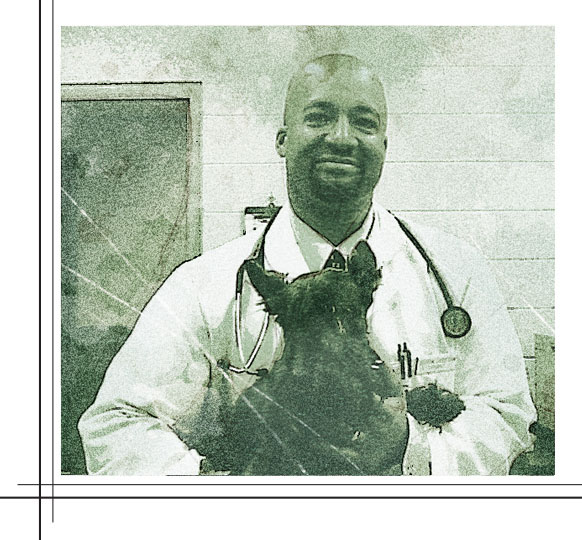

For many, becoming a veterinarian is a childhood dream; for Dr. Stephan Carey, Associate Professor at the Michigan State University College of Veterinary Medicine, that wasn’t the case. “I went to Duke University for undergrad and studied human medicine. I had way too much fun, but I also had a falling out with human medicine. Let’s just say, timing is everything,” says Carey.
During his senior year, Carey’s undergraduate advisor suggested veterinary medicine. “It was a great suggestion, one that changed the course of my life—well that, and the time I spent in a toxicology and research laboratory for the Environmental Protection Agency while I completed my prerequisites for vet school.” Carey envisioned himself working in a small animal hospital. But that vision changed when he was encouraged by his vet school mentors to consider specialization. “That’s when I landed at MSU for my rotating internship,” Carey adds.

That was in 2000, and he’s been a Spartan ever since. “I fell in love with MSU, and I fell in love with respiratory disease and physiology.” Carey decided to complete an internal medicine residency. “I realized once I got here that there were all these respiratory-disease powerhouses: Ed Robinson, Fred Dersken, Sue Holcombe—and they were all in large animal. Lucky for me, Dr. Ed Robinson became my de-facto mentor, and he introduced me to the one-and-only, Dr. Jack Harkema.”
Carey’s work with Robinson and Harkema originally was set to be a three-year residency project, after which he would begin his career as an internist. But again, Carey’s mentors and his own passions led him in a different direction. “The fact that Dr. Harkema was a veterinary pathologist who was impacting human health, creating advocacy to reduce air pollution, and protecting human and animal health—I was hooked. So, Jack convinced me to stick around and get my PhD.”
Industry stakeholders supported Carey’s decision; Pfizer (now Zoetis) sponsored his PhD. “Suddenly, I was given this opportunity to combine my new-found love for teaching with research and clinical training. It was truly perfect timing. Not to mention, I absolutely loved the work. I just couldn’t say no.”

Fast forward 22 years, and Carey is a leading toxicology researcher, clinician, and educator. “I had no idea that I was going to end up where I am now. I never envisioned that this is what my career would look like, and I really owe that to the product of fortunate timing, wonderful mentors, and opportunities at every step along the way. Now that I’m here, I couldn’t see myself anywhere else.”
Carey finds the multitude of opportunities to teach veterinary medicine to be his greatest reward. “When I’m giving a course on continuing education and I hear practicing veterinary professionals say, ‘I wish I had you in vet school’ or ‘I wish you had been the person to teach me about immunology or respiratory vaccinations,’ that’s the most flattering and rewarding thing to me.”
“That’s one of the things I like to bring to teaching: to make sure I know the material well enough to be able to teach it in multiple ways,” Carey continues. “If someone doesn’t get it, I need another way to come at it. That’s one of the most valuable lessons I learned from several of my mentors—Drs. Robinson, Ewart, Holcombe, and Harkema.”
Carey is a star educator, but his research is nothing to gloss over. “I love the fact that one week, I can be impacting children with cystic fibrosis and the way they receive therapy, and the very next week, I can be impacting cats that have respiratory diseases or dogs that have infectious diseases.”
From teaching students and treating patients, to advancing human and animal health through research, Carey is among the best of the best. “When I started vet school, I had it in my head where I was going; where I landed is so, so much better,” says Carey.

Check out Vet School Confidential, a reality TV tale that’s as old as time (2001), featuring the one-and-only Dr. Stephan Carey during his first years at MSU. “Vet School Confidential has to be my favorite memory from my time as a student veterinarian at MSU,” says Carey. “It was a circus, an absolute zoo. They got a bunch of shots of me sitting on the floor in the hallway, something I like to do in exam rooms because I don’t really like the hierarchy of me looking down at my patients.”